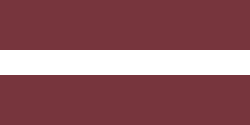| Latvia in the Eurovision Song Contest | |
|---|---|
| Eurovision Song Contest | |
 | |
| Participating broadcaster | Public Broadcasting of Latvia (LSM; 2025–present) Formerly:
|
| Participation summary | |
| Appearances | 25 (12 finals) |
| First appearance | 2000 |
| Highest placement | 1st: 2002 |
| Host | 2003 |
| Related articles | |
| Supernova | |
| External links | |
| LSM page | |
| Latvia's page at Eurovision.tv | |
| Latvia in the Eurovision Song Contest 2025 | |
Latvia has been represented at the Eurovision Song Contest 25 times since making its debut at the contest in 2000, where the song "My Star" performed by the group Brainstorm finished third. Latvia won the contest in 2002, with the song "I Wanna" by Marie N, defeating Malta by 12 points. Latvia is the second former Soviet country to win the contest. The 2003 contest was held in the Latvian capital Riga. The country achieved its third top 10 result in 2005, when "The War Is Not Over" by Walters and Kazha finished fifth. The current Latvian participating broadcaster in the contest is Public Broadcasting of Latvia (LSM).
Contents
- Participation
- Participation overview
- Hostings
- Related involvement
- Heads of delegation
- Commentators and spokespersons
- Photo gallery
- See also
- Notes
- References
Latvia did not participate in the final from 2009 to 2014, when they failed to qualify from the semi-finals for six consecutive years, including finishing last on three occasions, in 2009, 2010, and 2013. [1] [2] Latvia qualified for the final for the first time since 2008 at the 2015 contest with the song "Love Injected" by Aminata. Its sixth place in the final is Latvia's fourth top 10 finish and best result in the contest since 2005. Latvia made its 10th appearance in the final in 2016. After failing to qualify for the final from 2017 to 2023, it finally managed to qualify to the final in the 2024 contest with "Hollow" by Dons. The qualification streak was extended by Tautumeitas, whose song "Bur man laimi" became the first Latvian language entry to compete in a Eurovision final.
Latvia has the distinction of having finished last in the Eurovision semi-finals more than any other country. Since its introduction in 2004, Latvia has finished last in five semi-finals, with " Probka " by Intars Busulis (2009), "What For?" by Aisha (2010), "Here We Go" by PeR (2013), "Line" by Triana Park (2017), and "The Moon Is Rising" by Samanta Tīna (2021).

















